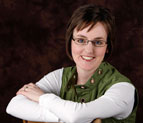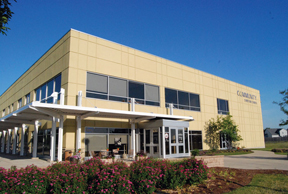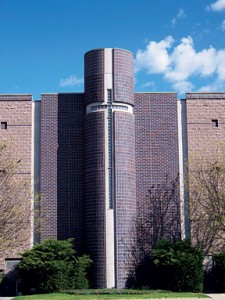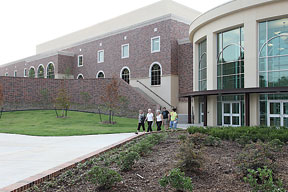
Terms like old, elderly, senior, golden-agers don’t seem to adequately describe boomers.
By Ronald E. Keener
 Amy Hanson was 23 years old when she was offered a new job at megachurch Central Christian Church in Las Vegas — to head up the active adult (50-plus) ministries of that congregation. She served in the role for five years before moving to Nebraska to complete her doctorate in gerontology.
Amy Hanson was 23 years old when she was offered a new job at megachurch Central Christian Church in Las Vegas — to head up the active adult (50-plus) ministries of that congregation. She served in the role for five years before moving to Nebraska to complete her doctorate in gerontology.
“The most important thing I brought to leading this ministry at a young age was a passion for this particular generation,” she says. “Effective older adult ministries are led by leaders who are passionate about the potential of this generation and see what God wants to do in and through them. I had to have a genuine love for this generation, a willingness to listen and learn from them, and an unwavering desire to be their advocate.” There were advantages of a young person in the position, she says.
“Having a young person lead the older adult ministry can bring unity to a church. Especially to a church that is contemporary in style. The young leader can be a bridge between the generations. Young adults who lead this ministry [in other churches] need to recognize that it may take them a little longer to establish trust with the adults they are serving. This takes time, but once it is established, most older adults will have a great deal of loyalty to their leader,” she says.
Today she leads a ministry focused on helping church leaders unleash their older adults to make a significant Kingdom impact. Her local church experience and her education in gerontology work in tandem as she equips pastors, denominational leaders, students, healthcare professionals, and older adults regarding the unique opportunities of an aging America.
 Hanson has written a book, Baby Boomers and Beyond: Tapping the Ministry Talents and Passions of Adults over 50, (Jossey-Bass, 2010). She has a website at www.amyhanson.org, and responded to questions from Church Executive:
Hanson has written a book, Baby Boomers and Beyond: Tapping the Ministry Talents and Passions of Adults over 50, (Jossey-Bass, 2010). She has a website at www.amyhanson.org, and responded to questions from Church Executive:
You note in the opening of the book that “These baby boomers who revolutionized youth ministry are now entering their fifth and sixth decades of life.” What changes did/do they bring?
Baby Boomers are approaching aging in a radically different way than the preceding generations. They have no desire to spend their retirement years sitting in a rocking chair or playing shuffleboard. Just as when they were young, they are interested in changing the world. They don’t want to get old and are doing everything they can to stay healthy and look young. Many boomers plan to keep working in some fashion, specifically in jobs where they are making a difference in society.
In community churches and multi-site churches, it seems that young families rule. Aren’t older adults left feeling excluded in the “youth” culture of today’s churches?
The church has unfortunately bought into the myth that the world is teaching us that “younger is better.” There is a pervading belief that growing churches have lots of young people and if you have too many older adults in your church that must mean you are a dying church. I think what churches fail to recognize is the potential to grow a church by growing the number of older adults.
Millions of adults over the age of 50 and over the age of 65 are not Christians. If we will be intentional about reaching these people for Christ, our churches will grow, especially when you consider that there are 78 million baby boomers. That’s a lot of people — many of whom are not connected to a church.
For those older adults already involved in the church, many are feeling like they are no longer important or valuable to the church. They are not being asked to serve or give of themselves. They are often not being brought into conversations because the church leadership believes the myths that older adults can’t change and they can’t learn new things.
It is crucial for church leaders to see older adults as essential to the mission of the church and involve them 100 percent in that mission. Older adults need to be recognized as having time, experience and resources to be invested in significant Kingdom work. These adults need to be called to something greater then themselves and viewed as vital and essential to the mission.
There is the issue of doing things to older adults vs. with or through older adults. What is that distinction and why is it important?
A ministry to older adults implies that the older adults are passive receivers in the relationship. The ministry involves giving something to them almost with the idea that they are “too old” to continue contributing to ministry and others need to now serve them. “Serve me by planning a trip.” “Serve me by hosting a potluck.” You get the idea. A ministry to older adults can also bring up images of visiting the frail elderly who are sick or in nursing homes. This is a vital and important ministry but it is a small component of older adult ministry.
 A ministry with or through older adults suggests that this is a ministry we do together. Everyone is serving and giving to the community. The leader is to “prepare God’s people for works of service” (Ephesians 4:12), not just plan activities for the older adults to enjoy. Older adult ministries need to be built around the idea that everyone has something to contribute. It is unselfish and all about being the body of Christ. It is doing ministry as Jesus describes in Matthew 20:28, “just as the Son of Man did not come to be served, but to serve.”
A ministry with or through older adults suggests that this is a ministry we do together. Everyone is serving and giving to the community. The leader is to “prepare God’s people for works of service” (Ephesians 4:12), not just plan activities for the older adults to enjoy. Older adult ministries need to be built around the idea that everyone has something to contribute. It is unselfish and all about being the body of Christ. It is doing ministry as Jesus describes in Matthew 20:28, “just as the Son of Man did not come to be served, but to serve.”
Are there real differences between older adults in their 50s, 60s, 70s, and 80s, and how programming is done in each decade?
I identify three groups in terms of programming or ministry with older adults. The oldest group could be considered the frail elderly and if we were to try and define this age group chronologically we might say they are 85 and older. There are many opportunities for ministry with this group, often involving hands-on stuff like visitation and helping with their personal needs.
The second group is more the 70-85 age group. For the most part, these adults are retired and are beginning to have some health issues. They also may be experiencing multiple losses — loss of a spouse, loss of their own health, loss of friends and siblings. For many churches, this is the group that the existing senior adult ministry has been built around. Sometimes these ministries have been overly focused on fellowship and social activities and have neglected to engage these adults in purposeful service and ministry.
The third group is generationally different. They don’t like being called a senior and never will. They do not want to get old. Many plan to continue working in some fashion as they approach the traditional retirement age. I describe this group as the new old. Chronologically they are the 50 to 70 age group; perhaps more specifically, the 55 to 70. They are dealing with concerns regarding retirement, grand parenting, caring for aging parents, and preparing for their own aging. They have time, experience and resources to invest in Kingdom work. They may be naturally searching for what their purpose is at this season in their lives. They do not want to go to an activity or program with the 70 plus year olds, who in some cases are their parents.
Of course, the numerical ages are arbitrary. Health and attitude play a tremendous role — but the gist is that there are three groups and if you design an older adult ministry around one of the two older groups, you will never reach the third group. The third group is looking for adventure and a place to make a difference. They don’t want to slow down or be identified as old.
You write that using terms old, elderly, senior, golden-agers all have negative connotations. Where do you lean in describing this group?
In most every conversation I have, adults don’t like the term senior or senior adult ministry. There does not seem to be one term yet that best describes the new old and I think this is because this group does not want to be forced to fit a certain mold they are just people.
With that said, there are a few terms I like: The encore generation is gaining popularity in society as it communicates that this generation has done some great things and we need them to do it again, to continue to contribute, to give us their very best during this season of their life. I also like using the term new old to describe that this group is looking at aging in an entirely different way than adults of previous generations. Finally, in conversation I use the term older adults. It seems that adults are at least accepting of that term whereas the term senior they are not.
Is the notion of intergenerational ministry still viable?
One of the best ways to do this is to get the generations serving together. An older man and a young person can work side by side on a Habitat for Humanity house. In this setting, they are working together for a common cause and their differences in music, fashion and a host of other things no longer matter.
Forecast a bit over the next five years for older adult ministry. What do you anticipate happening for older adults and for churches?
We will see churches create a brand new ministry to specifically target the aging boomer. The current senior adult ministry will not reach the new old and to be effective in reaching this generation we will need an entirely different ministry. Along with this, we will see a number of churches hiring a staff member to address all of the issues surrounding aging boomers.
With the rapidly growing number of older adults, we’ll see more church plants intentionally targeted at reaching adults 50 and older. I also think more churches will become sending agencies that launch older adults into significant ministry.
What mistakes are churches making in dealing with older adults as their churches grow and bring in young people and young married couples with kids?
It’s as simple as neglecting to think of who is sitting in the congregation on a Sunday morning. As churches reach young families, many pastors fail to speak to the needs and issues facing aging boomers. For example, when preparing a sermon illustration on selfishness, pastors need to consider how selfishness plays itself out in the life of a young mom and a retired couple. Adults will begin to feel unimportant and devalued when week after week the majority of the stories in a message do not relate to people’s daily life.
Another mistake leaders make is buying into the world’s myths about aging, like believing older adults can’t change and therefore not including them in discussions about church strategy or believing that older adults want to slow down and then not challenging them to lead major ministry efforts.
It’s been said that many youth leaders made the leap to be older adult ministry leaders. Have you seen that too?
Yes, I have seen some dynamic older adult ministries led by former youth ministers. Many of the components that make up a successful youth ministry are the same components necessary for having a great older adult ministry.
As a side note, I’ve also seen great older adult ministries led by former worship pastors, children’s ministers and even senior pastors. The key is that the person must have a passion for reaching this age group not just doing the ministry because they view it as a way they can slow down themselves.
—————————————————————————————————————————
Three churches doing older adult ministry well
 Community Christian Church in Naperville, IL is a multi-site campus based church with one of their sites in Carillon, a 55+ living community in the Chicago suburbs. The church at Carillon specifically reaches out to the 3,600 people who live within the community. Numerous adults are serving Christ inside and outside the walls of the community and are involved in small groups. As a result of the relationships being built, many of the adults living in Carillon have come into a relationship with Christ or found their way back to God.
Community Christian Church in Naperville, IL is a multi-site campus based church with one of their sites in Carillon, a 55+ living community in the Chicago suburbs. The church at Carillon specifically reaches out to the 3,600 people who live within the community. Numerous adults are serving Christ inside and outside the walls of the community and are involved in small groups. As a result of the relationships being built, many of the adults living in Carillon have come into a relationship with Christ or found their way back to God.
In October the church will launch a new campus in Romeoville, targeting active adults and empty-nesters, and a couple will move to the 55+ active adult Del Webb Sun City in Huntley, with a launch date for services in March 2011.
 LifeBridge Christian Church in Longmont, CO, established three different ministries with three separate leadership teams as a part of the overall ministry with adults 50 and better. The goal is to be more intentional at reaching the needs and issues of adults in different life stages. The age distinctions are not heavily advertised or explained in their promotional materials, but the distinctions ensure that the leaders are planning a variety of activities that will reach the various needs and interests of older adults. For example, ski trips and hikes may appeal to some older adults while luncheons and musical entertainment may draw others.
LifeBridge Christian Church in Longmont, CO, established three different ministries with three separate leadership teams as a part of the overall ministry with adults 50 and better. The goal is to be more intentional at reaching the needs and issues of adults in different life stages. The age distinctions are not heavily advertised or explained in their promotional materials, but the distinctions ensure that the leaders are planning a variety of activities that will reach the various needs and interests of older adults. For example, ski trips and hikes may appeal to some older adults while luncheons and musical entertainment may draw others.
Green Acres Baptist Church in Tyler, TX has a staff pastor with the title “Minister of Adult  Impact.” The ministry works at engaging any adult in service, but a special focus of the ministry is the baby boomer. In addition to mobilizing boomers for ministry, Adult Impact has social events, travel opportunities and educational programs all geared towards the baby boomer. There is a completely separate ministry (called Forerunners), led by a different pastor, for the senior adults.
Impact.” The ministry works at engaging any adult in service, but a special focus of the ministry is the baby boomer. In addition to mobilizing boomers for ministry, Adult Impact has social events, travel opportunities and educational programs all geared towards the baby boomer. There is a completely separate ministry (called Forerunners), led by a different pastor, for the senior adults.



Great article!